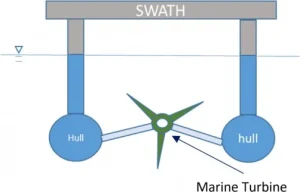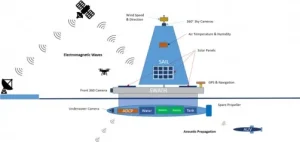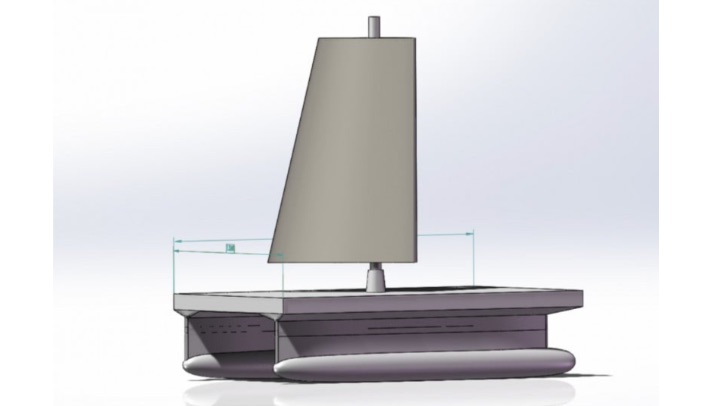Researchers from the College of Engineering and Computer Science at Florida Atlantic University (FAU) have proposed a design of an autonomous observational method for monitoring melting Arctic sea ice. It reportedly holds promise for improving the autonomy of marine vehicles and aiding maritime missions.
Autonomous observation vessel

The conceptual design features a small-waterplane-area twin-hull (SWATH) vessel that acts as a docking and charging station for AUVs and unmanned aerial vehicles (UAVs). The SWATH ship is engineered for exceptional stability, enabling it to navigate through melting ice and operate in a wide range of sea conditions. It is designed to be self-sufficient, using automated sailing, solar panels and an underwater turbine positioned between its twin hulls to generate and store energy, ensuring continuous mission support even when sailing against ocean currents.
Unlike prior platforms, the system designed by the FAU researchers will use advanced technology to monitor the Arctic Ocean from the air, water surface and underwater. The new unmanned surface vehicle (USV) design is specifically tailored for the project to ensure stability in Arctic conditions and handle high wind speeds. The observation platform system’s main objective is to investigate the melting sea ice area. Wind energy will be harnessed to facilitate sailing in the Arctic water, while an underwater turbine will generate sufficient energy to sustain the system’s operations.
Results of the study, published in the journal Applied Ocean Research, show that using the motion of a wind-driven sailboat to generate power from the turbine beneath the SWATH is a feasible way to support long-term Arctic Ocean monitoring missions. The design integrates with the environment it monitors, offering new data on Arctic Sea ice melt beyond what satellites and manned ships can provide.
“Our proposed autonomous observation platform system offers a comprehensive approach to studying the Arctic environment and monitoring the impact of melting sea ice,” said Tsung-Chow Su, senior author and a professor in FAU’s Department of Ocean and Mechanical Engineering. “Its design and capabilities make it well suited to overcome the challenges of the Arctic’s unique conditions. By providing a self-sustaining platform for continuous data collection, this design supports scientific research, environmental protection and resource management, laying the foundation for year-round monitoring of the Arctic.”
Self-sustaining tools
The FAU-designed vessel is essential for marine data collection, integrating UAVs and AUVs for real-time monitoring, resource exploration and research. The UAVs use high-resolution cameras and sensors for mapping and navigation, while AUVs gather underwater data. The DJI Dock 2 system enables UAVs to autonomously land, recharge and redeploy, while an advanced underwater docking system ensures AUVs can refuel and transfer data, extending their range. Survey instruments in the underwater hulls collect mission-specific data, which is processed on board and transmitted via satellite, enabling long-term, unmanned ocean monitoring.

The self-sustaining platform will use wind energy and marine current energy to achieve long-term monitoring in the Arctic Ocean. A dimensionless formula has been developed to estimate the minimum sail area required for varying sizes of SWATH in combination with a wind-driven power system.
“Our researchers have developed an innovative observation system tailored to the Arctic environment, offering critical data on sea ice melt that satellites and manned vessels are unable to capture. Long-term monitoring is essential, as it provides deeper insights into the lasting impacts of Arctic sea ice loss, which can guide informed policy and management decisions,” said Stella Batalama, dean of the FAU College of Engineering and Computer Science. “Additionally, there remains much to uncover about Arctic phytoplankton and algae, which play a crucial role in the food web and influence ocean-atmosphere interactions. This new system could enhance our scientific understanding of their ecological significance while supporting Alaska’s indigenous communities in adapting to future changes in wildlife and food resources.”
The first author of the study is Wenqiang Xu, a doctoral degree graduate of FAU’s Department of Ocean and Mechanical Engineering.



